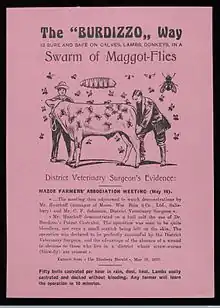Burdizzo

The Burdizzo is a castration device which employs a large clamp designed to break the blood vessels leading into the testicles. Once the blood supply to the testicles is lost, testicular necrosis occurs, and the testicles shrink, soften, and eventually deteriorate completely. When the device is used, the operator crushes the spermatic cords one at a time, leaving a space in between in order to prevent an interruption of blood-flow to the scrotum.
Animals

The burdizzo is used primarily on farm animals such as cattle and sheep.[1] For example, pampered cattle, used for Kobe beef, are often castrated by this method because of the reduced risk of bleeding and infection.[2]
Humans
Burdizzos have also been used by some human males as a means of self-castration , often by those seeking a remedy for a high libido, or those who, for religious, friends' influence, fun or personal reasons, seek to become eunuchs.[3] The burdizzo has also been used by some trans people, as an alternative to the surgical procedure known as an orchiectomy.
Because an incision is not required, castration by burdizzo is usually bloodless and, according to some research, has a lower risk of infection, compared with traditional methods. Since the burdizzo was not originally designed for human use, and fairly little research has been done on burdizzo castrations in humans, many physicians and others do not consider the burdizzo to be a safe castration method for humans. While the risks of blood loss and infection are low, anesthesia is, however necessary, as the burdizzo causes blunt force trauma to the spermatic cords, which are thickly wrapped in nerve fibres. So therefore, human use is disadvantageous as it may involve testicular infections.
References
- ↑ New York Times
- ↑ U.S.A. (2003-06-01). "The Believer - Tool: The Burdizzo® Emasculatone 9". Believermag.com. Retrieved 2016-07-20.
- ↑ "Miami New Times". Archived from the original on 2011-09-17. Retrieved 2011-02-10.
External links